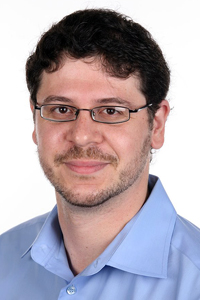Lauinger is named first Donnelley research fellow
By William Harmsw-harms@uchicago.edu
News Office
 Jacob Lauinger |
|
Jacob Lauinger saw a new world open up when, as a student of classical art and archaeology, he learned about the impact of the ancient Near East on Greek culture.
As a recent Ph.D. graduate in Near Eastern Languages & Civilizations, Lauinger will explore his interests further at Cambridge, where he will be the first Gaylord and Dorothy Donnelley Research Fellow at Corpus Christi College. His fellowship will run for three years.
The fellowship program has been established by a $4 million grant from the Gaylord and Dorothy Donnelley Foundation. Fellowships will alternate between Cambridge and Chicago and will be available to Chicago Ph.D. graduates from the divisions of the Humanities, Social Sciences and the Divinity School. A similar group of students at Corpus Christi College will be eligible.
For Lauinger, the opportunity to study in Cambridge will give him a chance to pursue two specific projects. In one, he will look at the emergence and disappearance of a little-known empire, which was located in the northern part of what is now Syria. In his second project, Lauinger will examine unstudied tablets that document the administration of a Mesopotamian city in the years immediately preceding its conquest by the reign of Hammurabi—author of the famous legal code in Babylonia.
“My interest in the ancient Near East came from a course I took as an undergraduate on the Eastern influences on Greek art. I suddenly got the big picture. Greece was a backwater in what was a much larger ancient world, one that revolved around the cultures of the Near East,” said Lauinger (Ph.D.,’07), who is an assistant professor of history at Roanoke College in Virginia.
In order to better understand the Near East, Lauinger knew he needed to learn to read the languages of the region. So, after graduating from Princeton in 1999 with a B.A. in art history and archaeology, he came to Chicago, where he became an Assyriologist and learned to read cuneiform texts.
That interest led him to explore documents related to the little-known empire for a book he is writing titled Inside the Empire of Yamhad: A History of Alalakh in the Old Babylonian Period, scheduled for publication in 2011. The empire, which flourished about 1800-1600 B.C., is not well-known because its capital is buried beneath the city of Aleppo and cannot be properly excavated.
However, archaeologists are excavating a settlement controlled by this empire, Alalakh. Lauinger is the epigrapher for this excavation, and his book will give him a chance to tell the social, political and economic history of the empire from the perspective of the empire itself. This perspective is valuable because the current understanding of Yamhad comes solely from accounts of Yamhad’s neighbors.
The book grows from Lauinger’s dissertation and will benefit from scholarly publications and other resources available only at Cambridge, he said. Those resources also will aid his second project, a study of 126 unpublished tablets from Adab, which are part of a collection at the Oriental Institute.
The tablets have been at the institute since they were recovered at an archaeological dig more than 100 years ago. “The really exciting thing about doing work on Near Eastern texts is that you get a chance to read something that no modern person has read before. It’s not like that in Latin and Greek,” Lauinger said.
Adab was an important urban center in Mesopotamia from the Early Dynastic to Old Babylonian period. “I want to see what the city was like before Hammurabi’s conquest and determine if, in fact, Hammurabi’s imperial administration was something new or if it relied on structures already in place. I hope that Adab can help me answer this question,” said Lauinger.
The Donnelley fellowship will provide an important opportunity for young scholars both at Chicago and Cambridge and will enhance the interaction between researchers at both universities, said Cathy Cohen, Deputy Provost for Graduate Education and the David and Mary Wilson Green Professor in Political Science and the College.
“We are very grateful to the Gaylord and Dorothy Donnelley Foundation for this wonderful support,” she said. “This fellowship will recognize early career scholars of exceptional promise and provide them the time and resources they need for their research efforts, as they turn their dissertation into a book or develop their next research project.”
Gaylord Donnelley studied at Corpus Christi College after his undergraduate years at Yale University and continued his association with Corpus Christi for the remainder of his life. During their married life in Chicago, Gaylord and Dorothy Donnelley greatly admired and provided support for the University. Gaylord was a Trustee from 1947 until his death in 1992. Dorothy, who died in 2002, was a member of the Women’s Board.
Providing a way for these two world-leading academic institutions to work together unites the Donnelley’s legacy interests.
![[Chronicle]](/images/sidebar_header_oct06.gif)